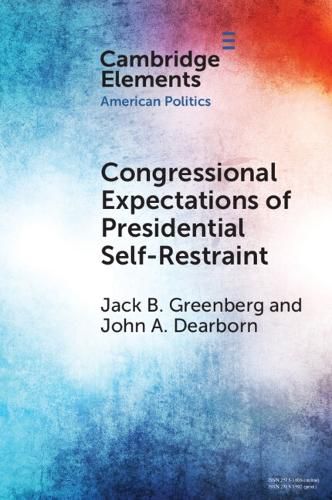Readings Newsletter
Become a Readings Member to make your shopping experience even easier.
Sign in or sign up for free!
You’re not far away from qualifying for FREE standard shipping within Australia
You’ve qualified for FREE standard shipping within Australia
The cart is loading…






This Element explores how Congress has designed laws reliant on an assumption of presidential self-restraint, an expectation that presidents would respect statutory goals by declining to use their formal powers in ways that were legally permissible but contrary to stated congressional intent. Examining several laws addressing political appointments since the 1970s - statutes involving the FBI director, Office of Personnel Management director, chairman of the Joint Chiefs of Staff, director of national intelligence, Federal Emergency Management Agency administrator, inspectors general, Senior Executive Service, vacancies, Social Security Administration commissioner, and Consumer Financial Protection Bureau director - the authors demonstrate lawmakers' reliance on presidential self-restraint in statutory design and identify a variety of institutional tools used to signal those expectations. Furthermore, the authors identify a developmental dilemma: the combined rise of polarization, presidentialism, and constitutional formalism threatens to leave Congress more dependent on presidential self-restraint, even as that norm's reliability is increasingly questionable.
$9.00 standard shipping within Australia
FREE standard shipping within Australia for orders over $100.00
Express & International shipping calculated at checkout
This Element explores how Congress has designed laws reliant on an assumption of presidential self-restraint, an expectation that presidents would respect statutory goals by declining to use their formal powers in ways that were legally permissible but contrary to stated congressional intent. Examining several laws addressing political appointments since the 1970s - statutes involving the FBI director, Office of Personnel Management director, chairman of the Joint Chiefs of Staff, director of national intelligence, Federal Emergency Management Agency administrator, inspectors general, Senior Executive Service, vacancies, Social Security Administration commissioner, and Consumer Financial Protection Bureau director - the authors demonstrate lawmakers' reliance on presidential self-restraint in statutory design and identify a variety of institutional tools used to signal those expectations. Furthermore, the authors identify a developmental dilemma: the combined rise of polarization, presidentialism, and constitutional formalism threatens to leave Congress more dependent on presidential self-restraint, even as that norm's reliability is increasingly questionable.